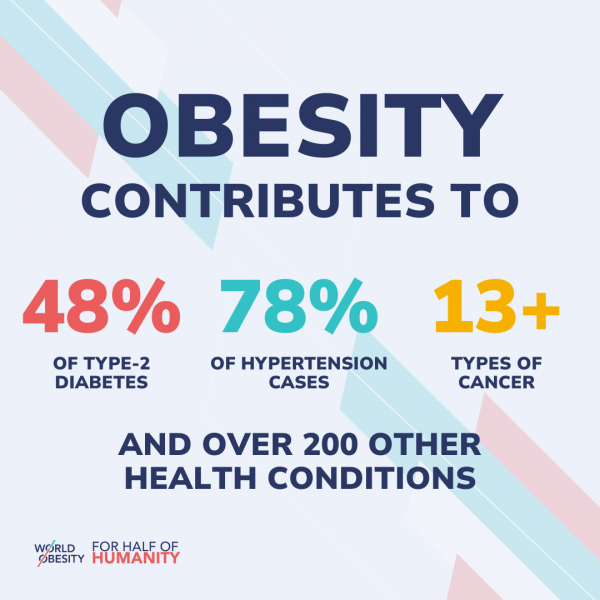Investing in action on obesity: Catalysing the double dividend
In a week where world leaders will be discussing financing for health and social development at the highest levels, World Obesity has published a new advocacy brief, making the case for action on obesity as a ‘win-win’ investment for countries in fiscally challenging times.
“Investing in Action on Obesity: Catalysing the Double Dividend” argues that investing in obesity prevention and management is both a moral and economic imperative, offering a “double dividend” of health and development gains. With over one billion people currently living with obesity and four billion projected to be affected within a decade, inaction will hinder global progress toward the Sustainable Development Goals (SDGs).
Obesity drives multiple noncommunicable diseases (NCDs), including diabetes, hypertension, and cancer, while costing the global economy nearly 3% of GDP by 2030. Multisectoral action is needed - spanning health, education, food systems - supported by coordinated financing mechanisms. Cost-effective interventions, such as the WHO “Best Buys” (e.g., sugar-sweetened beverage taxes, healthy food policies, and physical activity promotion), have demonstrated strong returns on investment. Additionally, investment in health systems will also be needed to ensure equitable access to effective treatment options.
Following the recommendations of the International dialogue on sustainable financing for NCDs and mental health, we emphasise the importance of domestic resource mobilisation, including health taxes and co-financing models across sectors, as the main sources of sustainable funding. Catalytic funds—such as WHO’s Health4Life Fund—and philanthropic contributions can complement national efforts, alongside multistakeholder partnerships.
Read the brief

There is an opportunity now for leaders to invest in addressing obesity as a way to change the course of global health. At this inflection point for the global health funding landscape, and looking ahead to the Third International Dialogue on Financing NCDs and Mental Health in 2026, this is a pivotal moment to ensure greater investment in and prioritisation of obesity.
Such investment will benefit not only the billions of people living with or at risk of obesity themselves but also have significant broader double dividends for health and for society.
Key messages from the brief:

Taking action on obesity saves lives and reduces healthcare costs, with a double dividend of addressing related health conditions.
At a time when global health financing is being reshaped, investing in solutions that are effective and impactful is more important than ever. Investing in proven obesity prevention and treatment solutions can reap a double dividend: generating health and economic gains while targeting a root cause of the NCD burden.

Investment in obesity action will deliver economic and development dividends.
The economic cost of obesity is predicted to reach nearly 3% of global GDP by 2030. Action on obesity will improve countries’ chances of achieving the Sustainable Development Goals (SDGs) by accelerating progress on health and other targets.

Investment must focus on multisectoral action.
As the World Health Organization Recommendations on obesity and Acceleration Plan to Stop Obesity make clear, effective action requires multisectoral action with investment from health, food, education and other sectors to provide comprehensive prevention and management services, in partnership with civil society and people with lived experience.

Resourcing multisectoral action on obesity is entirely feasible.
Making the case requires appealing to policymakers’ heads, hearts and pockets. Countries are already demonstrating that progress is possible and fast-tracking interventions through the WHO Acceleration Plan. There is an opportunity for donors to step up and support governments and civil society, and for the private sector to contribute through, for example, blended finance models.

Investing in action on obesity is the right thing to do.
Without action, half the world is being left behind - over 4 billion people will be affected within the next decade. People with lived experience of obesity and related NCDs are the most important advocates for change, and play a vital role in directing investment towards the most appropriate interventions.

Now is the time to mobilise investment.
Despite ongoing global challenges, there are opportunities in the current context. With the UN stepping up to support governments through the WHO Acceleration Plan, and new pharmacological treatments (GLP-1s) increasingly available, now is the time to mobilise investment.
Download our paper
Investing in action on obesity: catalysing the double dividend
World Obesity has published a new advocacy brief, making the case for action on obesity as a ‘win-win’ investment for countries in fiscally challenging times.
Download (4.67 MB)For half of humanity
Find out how you can join the call for urgent, united action on obesity. Explore resources, key messages, and advocacy tools in our For Half of Humanity campaign toolkit - and help ensure no one is left behind.
OUR CAMPAIGN